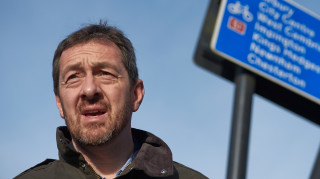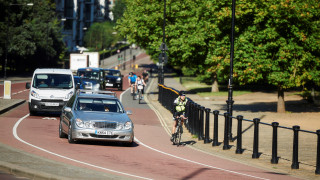The government’s Cycling and Walking Investment Strategy “won’t be worth the paper it’s written on” unless backed by sustained funding, said British Cycling and CTC, the national cycling charity, in their initial response to the Department for Transport’s draft proposals.
A new law, which came into force in July last year and applies in England only, made it a legal requirement for the first time for the government to set out a strategy that details the objectives and the financial resources that will be made available to cycling and walking for transport.
However the objectives and funding proposed in the government’s draft strategy, issued today for consultation, fall well short of the recommendations of the parliamentary ‘Get Britain Cycling’ report.
This called for investment in cycling of at least £10 per person annually, rising to £20, in order to boost cycle use to 10% of trips by 2025, and to 25% by 2050.
By contrast, the draft Cycling and Walking Investment Strategy provides central government funding of just £300m over period 2015-20, amounting to just £1.39 per person outside London.

Moreover its target to double cycling trips by 2025 implies even lower growth outside London, especially after allowing for population growth.
It would effectively boost cycle use from less than 2% of trips today to around 3.5%. Cycling makes up 19% of trips in Denmark and 27% in the Netherlands - where spending on cycling is around £24 per person annually.
British Cycling policy adviser Chris Boardman said: “The Department for Transport has done some good work on cycling and walking, including developing processes to make it easier for local authorities to create infrastructure plans and identifying funding pots that could be used.
"But these are just baby steps. Far more ambition is needed if we have any hope of creating a cycling and walking culture to rival countries like Denmark and the Netherlands, let alone the government’s own modest targets.
“The truth is that without sustained funding, this strategy won’t be worth the paper it’s written on. We know that when faced with other priorities like road maintenance, saving bus routes and new housing developments, cycling and walking will be put at the bottom of most councils’ to-do lists.”
“The government’s own figures show that investment is barely at £5 per head. Cycling’s ability to tackle serious societal issues such as obesity cannot be achieved on the cheap. This consultation exposes The Prime Minister as reneging on the ‘cycling revolution’ he promised us three years ago. If the government won’t commit to £10 per head every year, this strategy is stalling before it’s even got started.
“Boris Johnson, a prominent member of the Conservative party, has put our recommendations into practice in the capital and now has proof that it works, all in less than three years.”

CTC's policy director Roger Geffen said: “Despite its laudable aim to normalise cycling and walking by 2040, this strategy’s draft targets suggest that, outside London, English cycle use would eventually reach Dutch levels by the start of the 23rd century, while its funding allocations mean even slower progress.
"If ministers are serious about their stated aims, they need to reallocate some of their £15bn motorway and trunk road budget towards cycling and walking. That could help tackle congestion, pollution, physical inactivity and climate change, whereas roads spending will do the precise opposite.
“Ministers need to invest in cycling to overcome congestion, pollution, physical inactivity and climate change, not make them worse."
British Cycling and CTC want to see the following commitments made by government:
- Funding of at least £10 per head per year (£530 million in England), rising to £20.
- A comprehensive plan of how the targets, objectives and ambitions of the strategy will be achieved.
- A definitive, nationally-adopted design guide for cycling and walking infrastructure.
- A framework for assessing progress in delivering the strategy.
- Independent governance to challenge and support the strategy.













